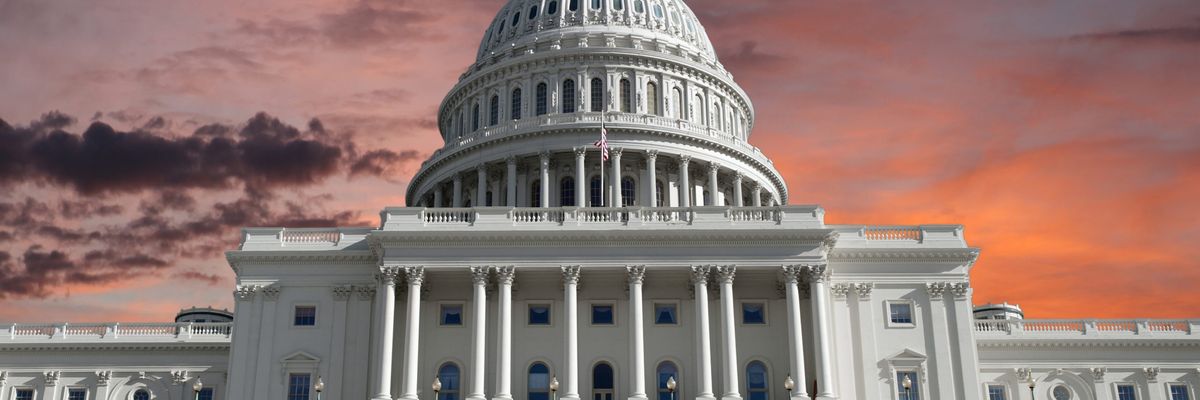Republicans and conservatives are increasingly showing support for rolling back war powers, as the House of Representatives prepares to vote on the Iraq War authorization this coming Thursday.
Both the Obama and Trump administrations had pushed back against attempts to repeal the 2002 authorization for the use of military force, or AUMF, which was originally passed to deal with Iraqi dictator Saddam Hussein but later stretched to justify other military operations in Iraq.
The bipartisan consensus seems to have flipped, with both the Biden administration and prominent conservatives now supporting a measure by Rep. Barbara Lee (D–Ca.) to take the Iraq War authorization off the books.
Americans for Prosperity announced on Monday that it would lobby for the measure, while the Heritage Foundation has been expressing support for repealing the 2002 AUMF as well.
“Congress really needs to get back in the gym…and exercise their Article 1, Section 8, Clause 11 muscles,” the foundation’s acting chief of staff Cully Stimson told a May 27 panel, referring to the section of the Constitution that provides Congress with the power to declare war.
He explained that lawmakers need to “get back in the habit of passing laws that are specific or repealing laws that have no longer any authority.”
U.S. operations in the Middle East are currently authorized under both the Iraq War authorization — which refers generically to “the threat posed by Iraq” — and the 2001 war authorization against the perpetrators of the 9/11 attacks. There are also Middle East war authorizations dating back to 1957 and 1991 still on the books.
Stimson said that the 2001 war authorization has also been “stretched beyond any imagination,” authorizing operations against not only al-Qaida but also a variety of militant groups around the Middle East.
Stimson’s comments are tapping into a wellspring of conservative support for broader war powers reform.
Rep. Peter Meijer (R–Mich.) advanced a bill last month to revoke the 1957 authorization. On May 20, as that bill passed the House Foreign Relations Committee, Meijer said that Congress should next take aim at the 2001 AUMF.
“Allowing our current military operations overseas to be guided by a twenty-year-old AUMF is a disservice to our service members and the American people and represents a dereliction of congressional responsibilities,” Meijer said. “I urge this committee to take up a new AUMF that carefully considers threats and potential boundaries, such as a defined mission, target groups, geographical constraints, and more.”
Meijer joins nine other Republicans currently co-sponsoring Lee's bill.
There is also a parallel effort in the Senate — led by Sens. Todd Young (R–Ind.) and Tim Kaine (D–Va.) — to repeal the 1991 and 2002 war authorizations. GOP Sens. Rand Paul of Kentucky, Chuck Grassley of Iowa, and Lisa Murkowski of Alaska are also listed as co-sponsors.
“You want to have issues of the engagement of military forces, decisions of whether or not you go to war, or authorize military force, taking place in a public forum,” Young said on the panel with Stimson. “That's the only way you can significantly engage the American people and rally them behind a cause, if there's public debate and consideration of these matters. That's what our Constitution calls for. It calls for Congress to declare war under Article 1, Section 8.”
He agreed with Stimson that the 2001 AUMF has also been “stretched beyond belief.”
Unlike the House bill, Young and Kaine’s proposal to end the Iraq War authorizations has yet to advance out of committee.
Kaine had said on Sunday that the effort was waiting on a “green light” from the Biden administration. That approval appeared to come on Monday, when the Biden administration announced its support for the House bill, indicating that the Senate effort may move forward soon.
The White House’s Office of Management and Budget stated that Lee’s bill “would likely have minimal impact on current military operations,” noting that there are “no ongoing military activities that rely solely on the 2002 AUMF as a domestic legal basis.”
The administration’s support for repealing the AUMF marks a major shift from the Obama era. When Sen. Paul worked with progressives to end the Iraq War authorization in 2011, the Pentagon pushed back, with top military brass arguing that they still needed legal authority for “limited windup activities normally associated with ending a war.”
Three years later, during the war against the Islamic State, then-President Barack Obama used the 2001 and 2002 AUMFs as his legal basis to re-enter Iraq and Syria. Congress and the White House eventually did try to pass an updated war authorization, but had clashing ideas on what it should look like.
Kaine and then-Sen. Jeff Flake (R–Az.) proposed repealing and replacing the 2001 AUMF with a narrow, time-limited war authorization. The Obama administration — along with Young, Senate Majority Leader Mitch McConnell (R–Ky.) and Sen. Lindsey Graham (R–S.C.) — supported bills with much looser restrictions.
The war authorizations remained unchanged when former President Donald Trump took office. He continued operations against the Islamic State under the same legal basis, while also using the 2002 AUMF to justify the January 2020 assassination of Iran’s General Qassem Soleimani.
Although Young supported the asassination, and Paul opposed it, both voted for a war powers resolution to restrain the President from further escalation with Iran.
“Unfortunately, for nearly two decades, Congress has been AWOL on certain matters of national security and attempted to pass the buck to our commander in chief when things go wrong,” Young said at the time. “As a Marine, I have been a tireless advocate for our men and women in uniform by reasserting Congress’ war making powers, and the need to jump start long overdue debates about our military engagements around the world.”
















